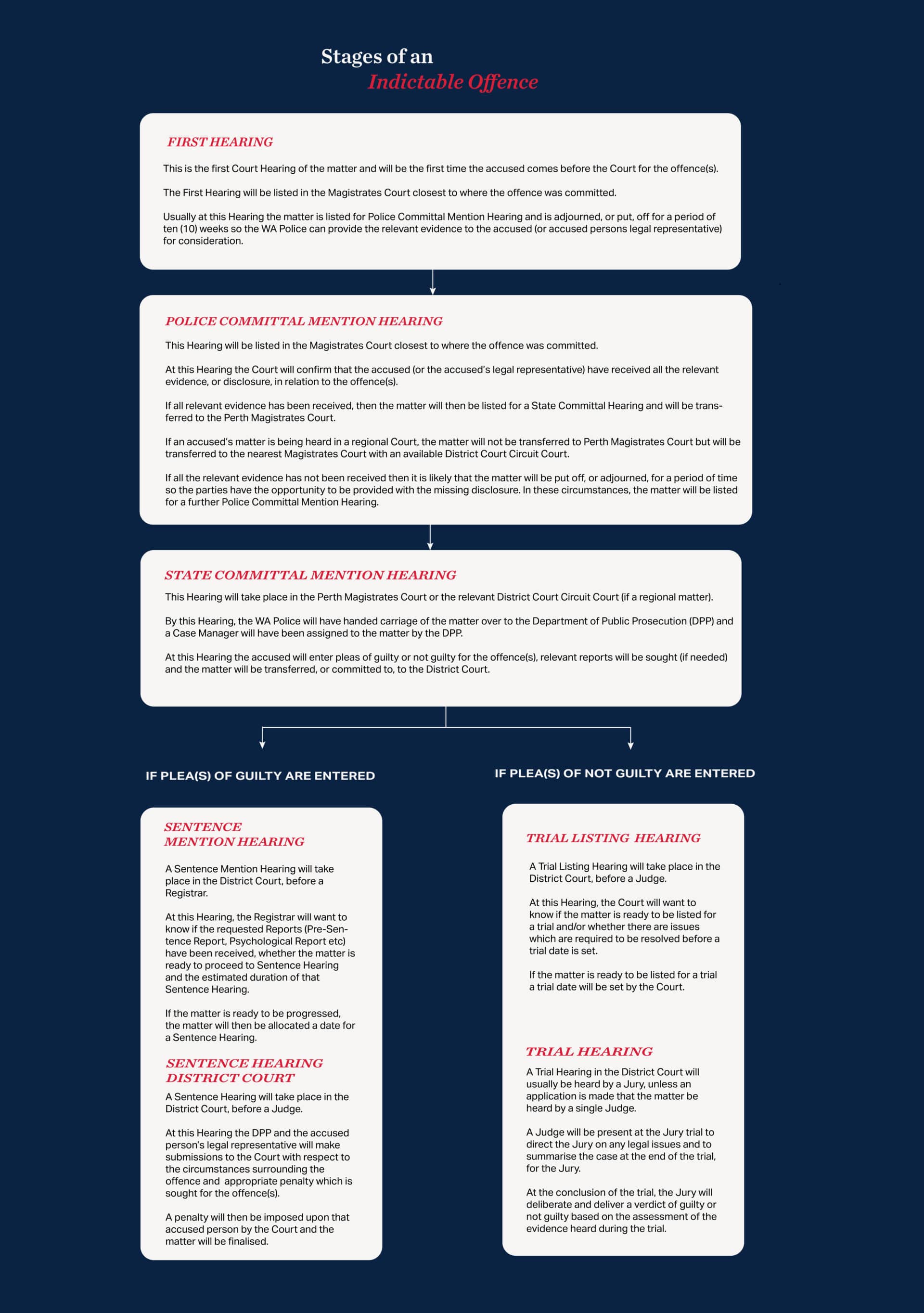Criminal Law
Get comprehensive criminal defence support from our team specialising in criminal charges, traffic offenses, restraining orders, and regulatory issues.
Your preferred office location

An indictable offence pertains to more severe criminal offences that, if proven, can result in significant penalties, often including longer jail terms. The term “indictable” comes from the word “indictment”, which is a formal written statement made by a prosecuting authority (the Department of Public Prosecutions). This statement details the crime the accused person is alleged to have committed.
In simpler terms, think of an indictment as an official charge sheet that says, “We believe this person did this serious crime, and here’s why.”
Now, in Western Australia’s legal system, offences and crimes are generally sorted into three main buckets:
Knowing the difference between these three types of offences is essential, especially if you or someone you know is involved in a legal matter.
Indictable offences are generally more severe in nature compared to simple offences. Examples include serious assaults, robbery, murder, and certain drug offences.
Indictable charges are typically heard in the District or Supreme Court of Western Australia, as opposed to the Magistrates Court where simple offences are usually dealt with.
One of the significant features of indictable offences is that the accused has the right to a trial by jury, though certain conditions might apply.
Some offences in Western Australia are termed ‘either way offences’. This means that while they can be treated as indictable or they can be heard summarily in the Magistrates Court. This decision often depends on the specifics of the case, the potential penalties involved, and any applications made by either defence or the prosecution.
Given their serious nature, indictable offences often come with substantial penalties, including lengthy imprisonment terms. The exact penalty varies depending on the specific offence, its severity, and any prior convictions of the accused.
If you or someone you know is facing an indictable charge, it’s imperative to seek legal counsel. Given the complexities and potential consequences associated with such charges, having a knowledgeable legal representative can make a significant difference in the outcome of the case. If you need assistance, please contact our experienced lawyers today
See a flow chart Download a copy
A Sentence Mention Hearing is a procedural step in the court process, typically taking place after an accused person has entered a plea of guilty to an offence but before they are formally sentenced by the court.
The primary aim of this hearing is to ensure that all necessary preparations are in place for the actual sentencing. This could involve checking that all required reports (like Pre-Sentence Reports, Psychological Reports, etc.) have been prepared and submitted. It’s a chance for the court to determine if everything is ready to proceed to the formal sentencing stage.
A Sentence Hearing is a formal court proceeding where the penalty or punishment for an individual who has pleaded guilty to, or been found guilty of, a criminal offence is determined and imposed.
A Trial Listing Hearing is a procedural step in the court process that takes place before the main trial. Its primary purpose is to ensure that all necessary preparations are in place for the trial to proceed smoothly.
A Trial Hearing is the formal court proceeding where the evidence related to a criminal or civil case is presented, and a determination of guilt or liability is made.


Get comprehensive criminal defence support from our team specialising in criminal charges, traffic offenses, restraining orders, and regulatory issues.

Expert advice & representation from our family lawyers for matters relating to divorce, separation, child-custody & support issues, mediation, and dispute resolution, and more.

Our experienced dispute resolution and mediation lawyers provide timely, efficient, and strategic advice on how to manage the dispute and achieve your desired outcomes.

Protect your assets & ensure wishes for your loved ones with a clear estate plan.
If you have any questions about our services, please use the form on the right and one of our staff will respond as soon as possible.
*This information serves as a general guide and does not constitute legal advice. It is based on our research and experience at the time of publication. Please consult our knowledgeable legal team for any specific inquiries or advice relevant to your circumstances, as the content may not have been updated subsequently.

Please select your nearest office location so we can show you the most relevant information.